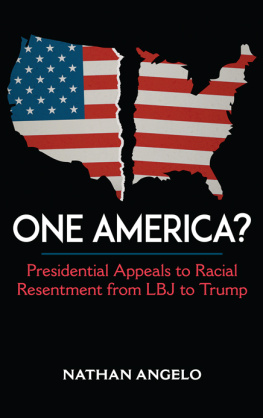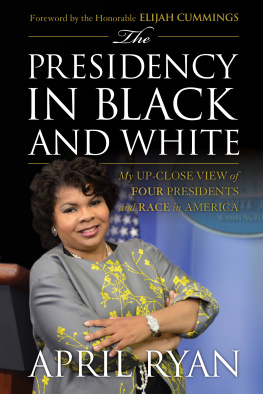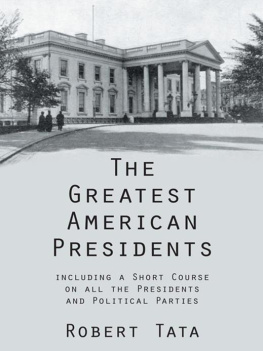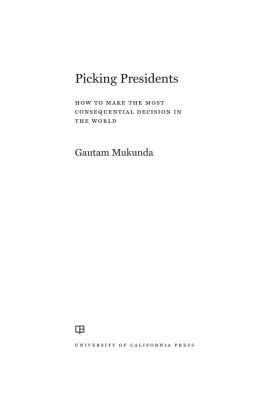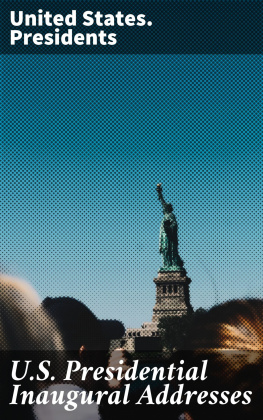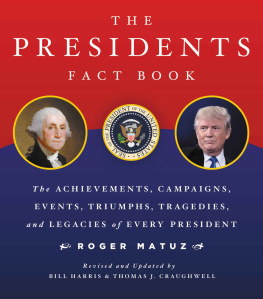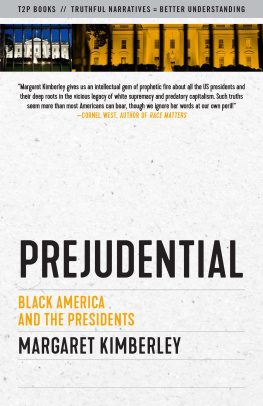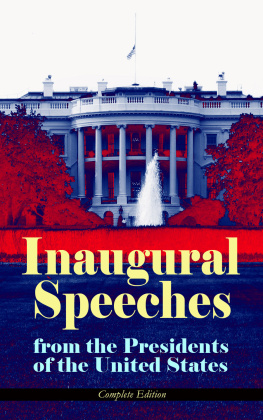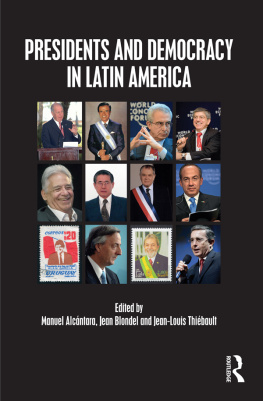ONE AMERICA?
ONE AMERICA?
Presidential Appeals to
Racial Resentment from LBJ to Trump
NATHAN ANGELO
Cover art by iStock by Getty Images.
Published by State University of New York Press, Albany
2019 State University of New York
All rights reserved
Printed in the United States of America
No part of this book may be used or reproduced in any manner whatsoever without written permission. No part of this book may be stored in a retrieval system or transmitted in any form or by any means including electronic, electrostatic, magnetic tape, mechanical, photocopying, recording, or otherwise without the prior permission in writing of the publisher.
For information, contact State University of New York Press, Albany, NY
www.sunypress.edu
Library of Congress Cataloging-in-Publication Data
Names: Angelo, Nathan, 1980 author.
Title: One America? : presidential appeals to racial resentment from LBJ to Trump / Nathan Angelo.
Description: Albany : State University of New York Press, 2018. | Includes bibliographical references and index.
Identifiers: LCCN 2017056056 | ISBN 9781438471518 (hardcover : alk. paper) | ISBN 9781438471532 (ebook)
Subjects: LCSH: PresidentsUnited StatesRacial attitudes. | United StatesRace relationsPolitical aspectsHistory20th century. | United StatesRace relationsPolitical aspectsHistory21st century. | PresidentsUnited StatesElectionHistory20th century. | PresidentsUnited StatesElectionHistory21st century. | Communication in politicsSocial aspectsUnited States. | RhetoricPolitical aspectsUnited States. | Political oratoryUnited States. | United StatesPolitics and government19451989. | United StatesPolitics and government1989
Classification: LCC E839.5 .A74 2018 | DDC 305.800973dc23
LC record available at https://lccn.loc.gov/2017056056
10 9 8 7 6 5 4 3 2 1
Contents
Illustrations
Figures
Table
Preface
Having spent the past several years reading and thinking about racial and ethnic politics in the United States, there was a part of me that watched Donald Trumps various speeches and debates, would pick out the many racial messages that were only sometimes concealed, and saw how his strategy might work. And yet, there was another part of me that was in disbelief when Trump won. Ill admit that like many Americans, I watched the news on Trump-the-candidate day after day, talked with colleagues, friends, and family members about the latest comments of the soon-to-be president. I had left-leaning friends ask me for my opinion as someone who studies American presidential campaigns. Whats going to happen? Trump cant win can he? Like many of us, I was rather seduced by the polls, even though I was aware that Trumps victory was well within the margin of error. My general answer was the same: I dont think hell win, but its possible. During the primaries, I found several reasons why he shouldnt win that were supported by political science. He didnt have the support of the party and the party establishment will send cues to voters which let them know who they should support instead. But, we now know that we were listening to different people in the establishment, and that the anti-Trump establishment was not uniform in their message of whom to support. He didnt have enough money and money is an important part of winning the primaries, but we also know that money doesnt always win elections. He didnt have the support of the majority so even if he was able to galvanize a small base of radical voters within the GOP, he certainly couldnt win the general election because he was too far to the right. Voters tend to vote for the most centrist option or the one that most closely matches their overall viewpoints. Many of these conclusions were logical, but he still won.
Sure, I was using research selectively and probably couldve been more careful in my own analysis of the election, but thats a good lesson that every researcher has to constantly relearn. We have our own intellectual biases and often those biases cloud our interpretation of the data. Sometimes our analysis leads us to choose examples and cases that prove the point we want to prove. My error was in my ability to think critically about the work that I had spent the better part of ten years thinking about. I had made the case over and over that presidential candidates shape their appeals to galvanize support from White Middle Americans. While the conclusion was never that presidents win because they do that, I had seen the pattern over and over. The strategy worked in the past. I know it worked. I have examples: Richard Nixon used it to capture Democratic voters in 1968 who harbored racial resentments and were disappointed by what they perceived as a rabidly pro-civil rights posture taken by the Democrats. Bill Clinton used it when he tried to appeal to those same folks by suggesting that we had all reached agreement on issues like welfare reform and law and order. So why was it a surprise that a candidate tried to gain support from White Middle Americans after the largest economic downturn in recent history, the first Black president, increased globalization that many likely linked to the exportation of jobs, and a widespread fear of terrorism? It wasnt. Or it shouldnt have been.
My research suggested that the approach was more viable than many in the media had suggested. Editorials appeared in The Nation , The Guardian , and several other newspapers telling us why Trump couldnt win. To be clear, those articles did not tell us why he might not win or should not win, but why he could not win. But he did. And White Middle Americans were a key to the Trump coalition. In that way, the Trump victory fits nicely into my research. There are competing efforts to control American discourse on racial politics. One welcomes a diversifying population while the other is more skeptical. And, there are people in both parties who view the pro-diversity, pro-immigration approach as the most strategic for the long term, even if that approach still retains those power relations that I find in this book. But, there are other folks who take an even more extreme preservationist approach. They want to see immigration cease to prevent, what they see as, the decline of White American identity.
This approach has persisted for years and has become a key part of how American presidents have defined American identity. It has been most evident in the rhetoric of the Right, but has been present in Left rhetoric as well. While many politicians claimed to be stunned by Trumps rise to power within the GOP, the astute analyst would have noticed that the GOP had been sowing the seeds of this strategy for years. Trumps strategy is not new and its not a revolutionary concept. His strategy is a logical progression of what has been happening in presidential elections since 1964. Though there have been notable attempts by some GOP insiders to change this approach, it has always been there. That is what this book tries to explain: the history of presidential rhetoric that has led us to the Trump election. How did we get here?
Acknowledgments
The writing of this book has been a long process that drew on the help of many. While I could only reach the conclusions that I reached in this book with the generous help of many around me, my mistakes are all my own. Through casual conversations, structured conference panels, and anonymous reviews, there have been several people who have offered their support and there are simply too many to name here. To all of those unnamed individuals who have given me advice, read chapters, offered feedback, or even just made a comment that helped me shift my perspective in some important way, I sincerely thank you regardless of whether it has been six days or six years since we last spoke. In addition, there have also been a select few whose assistance and support was critical. Victoria Hattams advice throughout most of this project was key. She read through chapter after chapter, patiently gave me advice despite my stubbornness, and found ways to push me into the right direction even when my inclination was to trail off on some other path. Deva Woodly gave me some particularly helpful advice at the early stages of this project, and helped me throughout by exposing me to vast array of untapped resources. She helped me approach things in ways that I might not have. David Plotkes help has been indispensable. His high standards and demands for clarity in my writing made the project what it is today. He was blunt, critical and did not spare my ego with his suggestions and I am grateful for his continued support.

